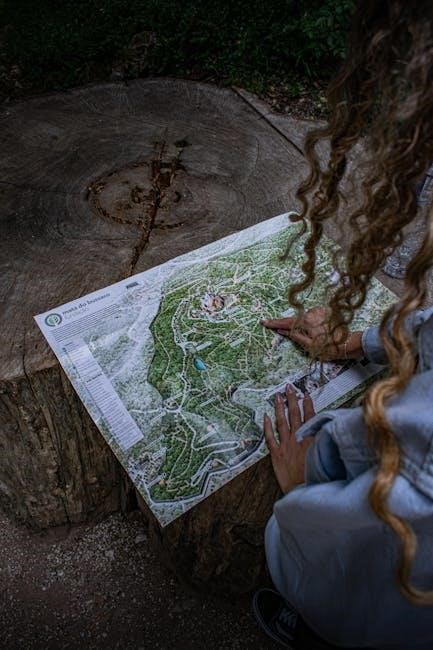The Pathfinder 2e Wizard is a versatile and iconic arcane spellcaster‚ offering unparalleled magical versatility and strategic depth․ Masters of arcane magic‚ Wizards solve problems creatively․
1․1 Overview of the Wizard Class
The Wizard is Pathfinder 2e’s quintessential arcane spellcaster‚ wielding a vast and diverse spell list․ As a prepared spellcaster‚ they must carefully select spells for their spell slots during daily preparations․ Wizards master arcane magic‚ with access to powerful schools like Evocation‚ Conjuration‚ and Illusion․ Their versatility allows them to adapt to any situation‚ making them a cornerstone of any adventuring party․
1․2 Role of the Wizard in a Party
Wizards serve as the intellectual and magical backbone of a party‚ providing both offensive and utility spells․ Their ability to adapt to various situations makes them indispensable․ Whether dealing damage‚ controlling crowds‚ or solving puzzles‚ Wizards offer strategic solutions․ Their spellcasting expertise allows them to fill gaps in party capabilities‚ ensuring versatility and effectiveness in any adventure․
Arcane Spellcasting and Preparation
The Wizard excels at arcane spellcasting‚ preparing a diverse array of spells daily․ Heightening allows for spell scaling‚ while managing spell slots is key to success․
2․1 Prepared Spellcasting System
The Wizard’s prepared spellcasting system requires careful selection of spells during daily preparation․ Each spell slot is assigned a specific spell‚ allowing for strategic flexibility․ Wizards can choose from a vast spell list‚ ensuring they are ready for any situation․ This system emphasizes planning and adaptability‚ making spell preparation a critical part of a Wizard’s daily routine․
2․2 Heightened Spells and Their Mechanics
Heightened spells in Pathfinder 2e allow Wizards to scale their magic by casting spells in higher-level slots․ This mechanic enhances spell effects‚ such as increasing damage‚ duration‚ or area‚ without requiring multiple spell versions․ Wizards can strategically use heightened spells to adapt to combat situations‚ making their spellcasting more flexible and powerful as they progress․ This system adds depth to spellcasting‚ rewarding tactical thinking;

Choosing a Wizard School
Selecting a Wizard school in Pathfinder 2e defines your magical specialty‚ offering unique abilities and focus spells․ Each school‚ like Evocation or Conjuration‚ shapes your playstyle and combat strategies․
3․1 Overview of Arcane Schools (Evocation‚ Conjuration‚ etc․)
Arcane schools in Pathfinder 2e include Evocation‚ Conjuration‚ Illusion‚ and others‚ each offering unique abilities․ Evocation deals direct damage‚ while Conjuration summons allies or objects․ Illusion manipulates perceptions‚ creating deceptions․ Each school provides distinct playstyles‚ allowing Wizards to specialize in damage‚ support‚ or deception‚ enhancing their versatility in both combat and exploration․
3․2 School Abilities and Focus Spells
Each arcane school grants unique abilities and focus spells‚ enhancing a Wizard’s magical prowess․ Evocation offers heightened damage potential‚ while Conjuration provides resilient summons․ Focus spells‚ prepared daily‚ allow Wizards to channel their school’s essence‚ delivering powerful effects like area damage or battlefield manipulation․ These abilities define a Wizard’s specialization‚ shaping their role in both combat and exploration․
Intelligence is crucial for Wizards‚ determining spellcasting effectiveness․ High Dexterity and Wisdom enhance survivability and perception‚ while appropriate skills like Arcana and Occultism support magical expertise․ Intelligence is the cornerstone of a Wizard’s power‚ directly influencing their spellcasting ability․ A high Intelligence score enhances spell accuracy‚ damage‚ and the ability to learn advanced spells․ Wizards rely on Intelligence to cast effectively‚ making it essential to prioritize this ability during character creation and advancement․ A strong Intelligence score ensures mastery of the arcane arts․
Wizards excel with skills tied to Intelligence‚ Arcana‚ and Occult․ Arcana aids in identifying magical effects‚ while Occult enhances understanding of mysterious phenomena․ Knowledge skills like Nature and Religion provide insight into specific domains․ Crafting and Tinkering Lore support item creation and repair․ Perception and Diplomacy are useful for awareness and negotiation․ These skills complement a Wizard’s magical prowess‚ making them versatile in and out of combat․ Early levels focus on mastering core spells and abilities․ Wizards gain access to heightened spells‚ enhancing their magical arsenal․ Strategic progression ensures versatility and power growth․ A Runic Weapon serves as a reliable damage source‚ freeing spell slots for utility․ Summoning strategies involve calling creatures to control the battlefield‚ offering both offense and defense․ Early-level summons provide valuable distractions‚ while higher-level options become combat powerhouses․ Mastering these tactics ensures wizards remain effective without relying solely on direct spell damage․ Proper management enhances overall party synergy․ In early levels‚ wizards should prioritize utility and control over direct damage to conserve spell slots and enhance party effectiveness․ Spells like Charm‚ Illusion‚ and Shield provide superior battlefield control․ Crafting items and using summoning tactics also reduce reliance on direct damage‚ ensuring survival and versatility․ This approach allows wizards to support allies while avoiding unnecessary risk‚ making them invaluable to the party’s success․ Mastering advanced techniques like spell blending‚ Arcane Thesis‚ and effective spell slot management can elevate your wizard’s magical prowess and strategic impact in any campaign․ Spell blending allows wizards to combine multiple spells into one‚ creating unique effects while conserving spell slots․ The Arcane Thesis provides specialized abilities tied to your school‚ enhancing versatility․ These advanced techniques require strategic planning and mastery‚ making them powerful tools for experienced wizards to adapt to complex challenges in creative and effective ways․ Managing spell slots is crucial for wizards‚ as they are a limited resource․ Prioritize spells that offer versatility and long-term benefits‚ saving higher-level slots for critical moments․ Track usage carefully and plan ahead to avoid depletion․ Use cantrips for minor tasks and conserve slots for strategic spells‚ ensuring optimal performance throughout adventures․ Effective slot management enhances both survival and magical impact․ Building a wizard involves selecting ancestry‚ background‚ and spells that align with your character’s theme․ Choose abilities and gear that enhance magical prowess and versatility․ Choosing the right ancestry and background is crucial for a wizard․ Elves are a classic choice due to their Intelligence boost‚ while other ancestries like Gnomes or Humans offer versatile traits․ Backgrounds should complement your wizard’s story and abilities‚ with options like Academic or Mage Apprenticeship providing skill boosts․ Selecting a background that enhances Intelligence or offers skill proficiencies can greatly benefit your wizard’s effectiveness in both spellcasting and problem-solving․ Additionally‚ consider how your character’s background influences their access to rare spells or magical items‚ further enriching their role in the party․ Explore diverse wizard builds‚ such as the Evoker‚ specializing in raw magical damage‚ or the Conjurer‚ mastering summoned allies․ Consider an Enchanter for battlefield control or an Illusionist for deception․ Pair these with unique ancestries and backgrounds to craft a scholarly Elf or a charismatic Human․ Each build offers endless customization‚ allowing you to tailor your wizard to your playstyle and campaign needs․ Essential gear for wizards includes a spell component pouch‚ staff‚ or wand for focusing spells․ Acquire a backpack for adventuring needs and a spellbook for prepared spells․ Wizards rely on specific equipment to enhance their magical prowess․ A spell component pouch or focus is crucial for casting spells․ A quarterstaff serves as both a weapon and a channel for spells․ Additionally‚ a backpack equipped with adventuring gear ensures preparedness․ A spellbook is vital for recording and preparing spells daily․ These items form the foundation of a wizard’s arsenal‚ enabling effective spellcasting and adaptability in various situations․ Magic items can significantly enhance a wizard’s spellcasting abilities․ The Cloak of the Mountebank grants invisibility and illusion magic‚ while the Headband of Vast Intelligence boosts Intelligence․ The Ring of Spell Storing allows wizards to store extra spells․ Additionally‚ wands and staffs provide convenient spellcasting options․ These items elevate a wizard’s magical prowess‚ offering versatility and power in both combat and exploration scenarios․ Mastering spell selection and preparation is key to a wizard’s success․ Focus on optimizing your choices and managing resources effectively to maximize magical impact in every scenario․ Wizards should prioritize spells that control the battlefield‚ debilitate foes‚ and support allies; Use area effects to impact multiple enemies‚ employ buffs to bolster party members‚ and save direct damage for critical moments․ Timing and positioning are crucial; always anticipate enemy movements to maximize spell efficacy while minimizing risks to yourself and your team․ To optimize your Wizard‚ focus on selecting spells and abilities that align with your playstyle and party needs․ Prioritize high Intelligence and relevant skills like Arcana and Occultism․ Leverage spell blending and Arcane Thesis for advanced techniques․ Choose a school that complements your strategy‚ and use focus spells effectively․ Balance damage‚ utility‚ and control to become an indispensable asset to your team․ The remastered Pathfinder 2e Wizard introduces a complete rework of arcane schools‚ enhancing magical versatility and power․ This update refines spellcasting mechanics for optimal performance․ The remastered Wizard class in Pathfinder 2e features reworked schools of magic‚ each with unique themes and disciplines․ Schools like Evocation and Conjuration now offer distinct playstyles‚ focusing on different aspects of arcane power․ These changes provide players with more specialized options‚ enhancing both character customization and strategic gameplay․ The update ensures each school feels unique‚ catering to diverse magical approaches and combat tactics․ The remastered version of Pathfinder 2e introduces new features for Wizards‚ including streamlined spellcasting mechanics and enhanced school abilities․ Heightened spells and Arcane Thesis options provide greater flexibility․ Additionally‚ the update offers improved character customization‚ allowing players to craft unique spellcasters․ These changes ensure the Wizard remains a dynamic and powerful class‚ with tools to adapt to any campaign’s demands and challenges; Discover essential Pathfinder 2e Wizard resources‚ including Tarondor’s Guide and the Legendary Class Guide․ Explore community forums and tools to enhance your spellcasting journey and character builds effectively․ Enhance your Wizard journey with Tarondor’s Guide and the Legendary Class Guide․ Explore spellcasting strategies‚ character builds‚ and optimization tips in these comprehensive resources․ Utilize online forums like Pathfinder 2e Subreddit and Discord communities for shared insights․ Tools like Pathfinder 2e Spell Cards and character builders streamline preparation and gameplay‚ ensuring your Wizard is both powerful and unique․ Engage with the vibrant Pathfinder 2e community through forums and Discord servers․ Websites like Paizo Forums and Reddit’s r/Pathfinder2e offer extensive discussions on wizard builds․ Join live streams and Patreon groups for expert insights and character optimization tips․ Participate in community events to share strategies and learn from fellow players‚ enhancing your wizard’s effectiveness in both combat and roleplay․Ability Scores and Skill Selection
4․1 Importance of Intelligence for Wizards
4․2 Key Skills and Their Uses

Early Levels and Character Progression
5․1 Runic Weapon and Summoning Strategies
5․2 Avoiding Direct Damage in Early Levels
Advanced Wizard Techniques
6․1 Spell Blending and Arcane Thesis
6․2 Managing Spell Slots Effectively
Building a Wizard Character
7․1 Ancestries and Backgrounds for Wizards
7․2 Sample Builds and Concept Ideas
Equipment and Magic Items
8․1 Essential Gear for Wizards
8․2 Magic Items to Enhance Spellcasting

Tips for Playing a Wizard
9․1 Strategic Use of Spells in Combat
9․2 Optimizing Your Wizard for Success
Remastered Updates and Changes
10․1 Reworked Schools of Magic
10․2 New Features in the Remastered Version

Resources and Guides
11․1 Recommended Reading and Tools
11․2 Community Resources and Discussions
